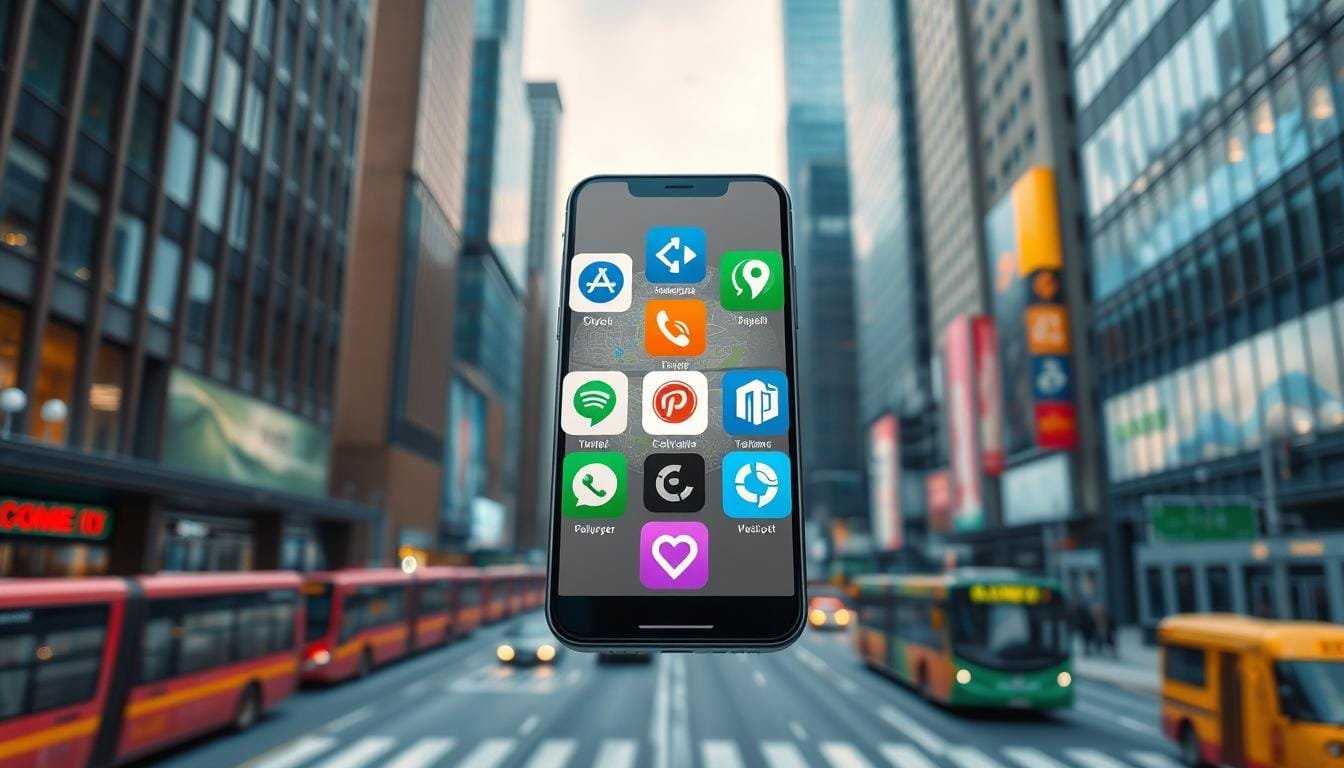Planning your commute or exploring a new city in the USA? Let’s dive into the world of USA transport apps. These apps are changing how we travel in cities. They offer many features to make your journey smoother.
These apps give real-time updates on buses, trains, and subways. They also show alternative transport options like bike-sharing and e-scooters.
Take the Transit app, for example. It covers over 300 US cities and supports more than 1000 public transit agencies. Whether you’re in New York City, Los Angeles, or Chicago, you’ll find reliable data at your fingertips. The app even works offline, letting you access schedules and maps without an internet connection.
Commute planning has never been easier. These apps suggest personalized routes combining various transport modes. They ensure you reach your destination efficiently. Many even allow in-app payments for transit fares and bike-share passes in numerous cities across the country.
Stay tuned as we explore some of the leading USA transport apps. They are revolutionizing city transportation and making travel more accessible for everyone.
Leading USA transport apps for Urban Navigation

Navigating big cities can be tough. That’s why urban navigation apps are great. We’ll look at three top public transit apps that make city travel easy.
Transit App: Real-time tracking and trip planning
Transit App is a strong tool for city travel. It tracks and plans trips in 300+ US cities. It mixes different transport ways, ideal for using many modes.
Users can use offline maps and get directions with the GO feature.
Moovit: Community-powered transit information
Moovit is known for its community focus. It helps over 930 million users worldwide. It gives real-time info and alerts for service changes.
Its AR wayfinder and live navigation make it a favorite for public transit users.
Citymapper: Multi-modal transportation solutions
Citymapper is great at comparing travel options. It works with ride-sharing and offers personal experiences. The app works offline and fits with wearable devices, making it flexible for city travelers.
| App | Key Features | Coverage |
|---|---|---|
| Transit App | Real-time tracking, offline maps, GO feature | 300+ US cities |
| Moovit | Community insights, AR wayfinder, live navigation | 3,400+ cities worldwide |
| Citymapper | Multi-modal comparison, ride-sharing integration, offline mode | Major US cities |
These apps change how we use urban transit. They give real-time updates and detailed trip plans. They help with complex systems like New York City’s 24 subway lines and big bus network.
Whether you live there or are just visiting, these tools improve your city travel experience.
Essential Features of Modern Transportation Apps
Today’s transport apps change how we move around cities. They are key tools for city travelers. They make planning and taking trips easier.
Real-time updates are a big plus. They give users live info on when buses or trains will arrive. They also tell you about service delays and traffic.
Offline maps are a big help. They let you navigate even without internet. This is great for places with bad signal.
Digital payments make paying for things easy. You can buy tickets and split fares with friends in the app. No need for cash or other payment systems.
- Multi-modal trip planning
- Personalized route suggestions
- Crowdsourced information on vehicle conditions
- Integration with bike-sharing and e-scooter services
The logistics world loves mobile tech. Over 90% of companies use mobile apps. These apps work in over 150 languages, helping people all over the world.
| Feature | Benefit |
|---|---|
| Real-time tracking | Improved route optimization |
| Data analytics | Better decision-making |
| AI and ML integration | Enhanced demand prediction |
| IoT device connectivity | Reliable shipment monitoring |
These features make using apps better. They also help make city travel more efficient and green.
Conclusion
USA transport apps have changed how we navigate cities. They make traveling more efficient and offer great public transit options. These apps are key for people living in cities and visitors.
The demand for these apps is growing fast. It’s expected to reach $283 billion by 2028. Apps like Transit, Moovit, and Citymapper are leading the way. They offer real-time updates, community tips, and help plan trips using different ways to travel.
Looking ahead, these apps will work better with smart city plans. This could make traveling even easier and greener. It might also help reduce traffic and make cities more sustainable. These apps will keep playing a big part in how we move around cities in the U.S.



